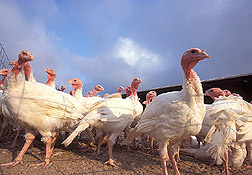This page has been archived and is being provided for reference purposes only. The page is no longer being updated, and therefore, links on the page may be invalid.
Read the magazine story to find out more. | Revolutionizing Turkey Production With Functional GenomicsBy Rosalie Marion BlissSeptember 8, 2004 A new method has been found for analyzing turkey genes responsible for key proteins important to the hens' fertility. Isolating such proteins could be a boon to U.S. producers, who must artificially inseminate the huge flocks of hens that put about 5.6 billion pounds of turkey on our tables annually. The analytical method was refined by Agricultural Research Service (ARS) reproductive physiologist Kurt A. Zuelke, who heads the ARS Biotechnology and Germplasm Laboratory in Beltsville, Md. The method, called SAGE—for Serial Analysis of Gene Expression—is a computerized form of functional genomics and was originally used for human cancer research. Zuelke adapted SAGE for the laboratory's livestock research. The researchers used the SAGE technology to study genes in the turkey hen's reproductive tract after artificial insemination. They measured gene expression and genetic differences between cells in the presence of sperm, and the same cells when no sperm were present. Expressed genes are those that are "switched on" at a given time and, in turn, make proteins. Counting the number of RNA transcripts, or copies, made by switched-on genes indicates expression: Many transcripts signal high expression, while few transcripts suggest low expression. Zuelke's team was the first to report in scientific literature that the presence or absence of sperm in a turkey hen's reproductive tract affects gene expression. Learning which genes are switched on when sperm are present will help researchers identify which proteins are produced under those special circumstances. Those proteins could then potentially help prolong the life of turkey sperm for artificial insemination. Currently, the viability of turkey sperm outside of males, called "toms," is only 10 hours—a relatively short period of time in which to inseminate hens. Extending the sperm survival time to overnight would greatly expand the range of options available for producers' artificial insemination operations. Read more about this research in the September issue of Agricultural Research magazine. ARS is the U.S. Department of Agriculture's chief scientific research agency. |


